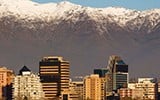If you have always dreamed of visiting Chile in all its glory, hiking and trekking, walking on glaciers, visiting wine routes ...
Living in Chile guide for expats
All the information you need to relocate and live in Chile.
Our selection of articles for expatriation in Chile
In order to open a bank account in Chile, you need a RUT number (or Chilean national ID), and therefore, you must have residency ...
Healthcare in Chile is modern and affordable and is rated as the best in Latin America; yet, it is not without its problems. Data ...
It is quite challenging to get a job in Chile, and if you don't speak Spanish, your options are even more limited. If ...
Chile is ranked as a high-income economy (first world or developed country) by the World Bank and is considered as South ...
Chile is a country which is very developed in some ways, such as infrastructure, and very underdeveloped in others like poor ...
Chile is considered one of the most stable economies in Latin America. As a tax-friendly country with a comparatively low cost of ...
If you want to boost your resume and gain professional experience that will help you jumpstart your career, an internship is ...
Rentals are common in Chile. In small towns or rural parts, houses and cabins are the most common options. In the city ...
There are many options for housing in Santiago, including many different types of areas to live as well as different price ...
Chile has a history of strong private property rights for Chilean citizens and foreigners alike. Although the government may ...
In recent years, Chile has become an important destination for students from around the world who want to continue or further ...
Lifestyle in Chile greatly depends on whether you opt for the city or country life, the climate, and many other cultural factors ...
Chile's culture and traditions stem from its fairly homogeneous population of indigenous people, mainly the Mapuche, and the ...
Chile is a very family-friendly country, and people love seeing children and families. Chile is also a very safe place to raise a ...
About Chile
The economy of Chile
This country of a projected 19 million people living in an area of 756,096.3 km² is one of South America's most stable and economically prosperous countries. With Chile's growing economy, low corruption rates, and low poverty levels, it is an ideal place to relocate. Chile's economy is based on the exportation of several products such as timber, wine, salmon, fruits, vegetables, copper and other minerals. The steadily increasing tourism industry also provides plenty of opportunities for local business growth.
Travelling in Chile
As a tourist, it is very easy to travel around Chile. Airfares within the country are reasonable, but buses are the cheapest way to go. For example, if you want to hike a volcano in the southern city of Osorno, depending on the season, it will cost you 80,000 CLP-160,000 CLP round trip to get there from Santiago, not including baggage. On the other hand, a round trip bus ticket costs 25,000-50,000 CLP.
At nearly half the cost, the bus is a great option. The bus system and the highway system are reliable and modern. Due to high gasoline prices for a personal car and the fact that buses go almost everywhere, the majority of Chileans choose the bus as their preferred method of travel. It may take longer than a flight to arrive at your destination, but if you score a seat on an overnight bus, you can go to sleep and wake up in a new city. Plus, you save yourself one night of accommodations.
If you prefer to be more in control, car rentals are also readily available in most major cities, and you can legally drive with your home country’s driver’s license for a period of up to 90 days, or the length of your tourist visa.
The regions of Chile
Chile has sixteen regions. Six of these are north of Santiago and include the major cities of Iquique, La Serena, and Antofagasta. In the northern regions of the country, you will find the largest open-pit copper mine in the world, the largest solar power plant in Latin America, lush agriculture in fertile valleys, and many world-renowned astronomical observatories including the largest telescope on earth!
The two regions in central Chile are Valparaiso and Santiago. More than half of the population lives here, and many international and Chilean companies, as well as government offices, call these regions home. Valparaiso is a coastal city and includes Chile's largest port. The mild Mediterranean climate of this area is a big attraction.
To the south of Santiago, you will find the agricultural regions where most of the wine grapes, fruits, and vegetables are grown. For example, the O'Higgins Region predominantly produces apples and pears. Maule and Nuble are the wine regions, whereas Bio Bio is the manufacturing and timber region. Araucania is the granary of Chile and famous for Lago Villarrica that accompanies Volcan Villarrica which offers guided tours to its snow-capped crater--that is when it is not erupting.
Further south, you will encounter the Lakes regions of Los Rios and Los Lagos. This region attracts many tourists with its lakes surrounded by snow-capped volcanoes as well as its wet temperate climate with mild wet winters and mild dry summers. Cattle and dairy farming are the main industries here.
The last two regions of Aysen and Magallanes are somewhat remote as they aren’t easily accessible by car without taking a few ferries, flying, or going the long way around through Argentina. The predominant industries of these areas are sheep ranches, aquaculture such as salmon farming, and tourism during the summer months. The picturesque main attractions are the glaciers, the national park of Torres del Paine, and the Strait of Magellan. The southernmost city in Chile, Punta Arenas is the capital city of this region, and the climate is cool, wet, and very windy.
Volcanoes, earthquakes and tsunamis in Chile
In the last 20 years, there have been 15 volcanic eruptions throughout Chile. While this, in addition to the frequent earthquakes, may sound dangerous, the government of Chile is always monitoring volcanoes and has an alert system that notifies people long before an eruption occurs, allowing them to evacuate if necessary. To date, only five people have died as a result of volcanic eruptions in Chile. The largest earthquake in recorded history occurred near Valdivia in 1960 and saw the deaths of 1,655 people mostly due to the tsunami that occurred as an effect of the quake. While these threats exist, they are not as dangerous as they sound. When in doubt, they say to watch a local’s reactions to these situations and do as they do.
Living in Chile
Safe, modern, and beautiful with a population that is quite welcoming to immigrants, Chile is an ideal place to live. Relocating to Chile is relatively easy for citizens from the US, Canada, Australia, New Zealand, or the EU. If you choose to come as a tourist, you will receive a 90-day tourist upon arrival that can be renewed for up to another 90 days.
However, unlike in the past, now there are limited options to apply for a Temporary Resident visa while in the country, and the Chilean government strongly encourages all applicants to process their visas prior to arrival. This can be done at the nearest Chilean consulate and requires some paperwork in addition to a passport, a roundtrip ticket, copies of hotel reservations or a notarized letter for a homestay, and some proof of income. Please see our other articles on these topics for more detailed information.
Useful links:
Latest job offers in Chile










